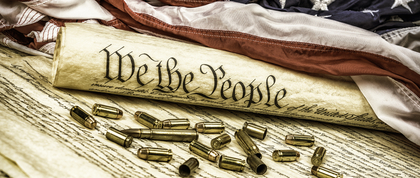
There is a clear sense of urgency to enact reasonable gun control measures to prevent gun violence in America. Last week reports surfaced stating that the Trump administration would actually support some form of firearm policy. However, hopes for meaningful reform were dashed yesterday when the President told FOX News, "No, we are not moving on anything. We are going very slowly in one way because we want to make sure it's right." (CNN) One reason noted for this change was the strong opposition voiced by the National Rifle Association (Washington Post).
Another reason is that firearm manufacturers and their supporters have engaged in a comprehensive strategy to successfully support deregulation of firearms in the United States at the federal, state, and local levels of government. The lack of meaningful gun control across most of the country exists against the backdrop of three legal issues specific to firearms: (1) the Second Amendment of the U.S. Constitution; (2) state preemption of local laws; and (3) federal and state lawsuit immunity and standing laws. As a result, the regulation of firearms -- and the lack thereof -- is fundamentally different than the regulation of other public health issues.
First, no other product that causes harm (e.g., tobacco, soda, alcohol) receives constitutional protection. The Second Amendment to the U.S. Constitution states: “A well regulated Militia, being necessary to the security of a free State, the right of the people to keep and bear Arms, shall not be infringed.” In 2008, the U.S. Supreme Court interpreted this amendment to broadly protect “the right of the people to keep and bear arms,” ignoring the introductory clause related to a militia. Yet, this was not always the case. In a 1939 case, the Supreme Court had interpreted the right to keep and bear arms as having “some reasonable relationship to the preservation or efficiency of a well regulated militia” (J. Vernick, et. al., 2011) This interpretation overturned long-standing precedent and arguably conflicts with legal interpretation standards which require meaning to be attached to all clauses. While there once was hope that a new Supreme Court with different Justices would revert to its earlier interpretation, the current president’s appointment of conservative justices may render such a change impossible in our lifetime.
Second, state preemption pervades gun control. Preemption occurs when a higher level of government restricts or withdraws the authority of a lower level of government to act on a particular issue. State and local governments have historically protected the health and safety of their populations more vigorously than has the federal government (The White House, 2009); however, in the context of firearms (Grassroots), states have refused to act while blocking the ability of local governments to address the needs of their communities. Approximately 43 states preempt local control over firearms, which is more than double the number of states that preempt local policies in other public health contexts, such as smokefree air laws, food and nutrition, or fire sprinkler laws. Preemption of local control is of particular concern in the area of firearm safety due to the lack of meaningful federal and state regulation (Giffords Law Center).
Third, unlike other products that harm users, bystanders, and intended targets, the federal government and more than half of the states have granted broad immunity from liability to manufacturers of firearms. In 2005, the federal government enacted the Protection of Lawful Commerce in Arms Act (PLCAA) broadly prohibiting lawsuits against manufacturers, distributors, dealers, and importers of firearms or ammunition products, and their trade associations. State laws provide similar immunity. Even worse, perhaps, is that many states have started granting standing to the National Rifle Association and other people the right to sue local policymakers and local governments if they enact a law that the state considers preempted. Local officials must defend these lawsuits using their own resources, as states often forbid the use of public funds to defend or reimburse local officials sued under these laws. Through these means, the gun industry has successfully removed even discussion of most policy options and litigation opportunities at the federal, state, and local levels.
But the private sector isn’t waiting to act. The firearms manufacturer Colt announced yesterday that they will no longer produce AR-15s for the consumer market (NPR). The retailer Costco has banned guns in their stores and CVS, Kroger, Starbucks, Walmart and others have proactively urged their customers to leave their guns at home, even in open carry states (Inc. Magazine).
Advocates have long since grown weary of the lack of progress and are taking their case straight to the public with powerful messages like Back to School Essentials, released this week by Sandy Hook Promise (video below). This bold public service announcement has been widely covered by the news media and shared on social media, providing a badly needed and perfectly timed tailwind that we all hope reaches our elected officials and prompts them to finally respond to this public health crisis. The time to talk about it has passed and they must now #DoSomething.

Jennifer Pomeranz, JD, MPH
Assistant Professor of Public Health Policy and Management
Video: Survive the school year with these must-have back to school essentials.
**Please note that this PSA contains graphic content related to school shootings that may be upsetting to some viewers.**
Source: Sandy Hook Promise
